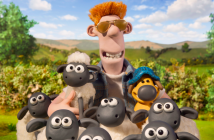
Editor’s Notes: The Kindergarten Teacher opens in Toronto on August 14th - Carlton Cinema and in Montreal on August 14th - Cinema du Parc + Cinema Beaubien.
The Kindergarten Teacher (Lapid, 2014) explores how poetry, amongst other historic arts, is being lost to a world of increasing modernity and materiality. It illustrates how a young genius akin to a young Mozart would go unnoticed today, stifled by a society that simply doesn’t care about his talent, a talent which would be encouraged and admired by a former era.
Illustrates how a young genius akin to a young Mozart would go unnoticed today, stifled by a society that simply doesn’t care about his talent.
Nira (Sarit Larry) realizes the banality of modern existence. Her husband sits on the couch watching game shows; her son has graduated and must now begin his mandatory Israeli army training. War and money and media are the commodities of modern life. But she seeks something deeper. She practices poetry at the Graduate level—a student of the arts. But even her poetry is banal, a reflection of her own inability to capture the wonder of the world which intrigues her. When she recognizes the pure poetic soul of one of her students, Yoav (Avi Shnaidman), it opens her up to the gift, the wonder, the world of poetry. She makes it her mission to encourage the boy, perhaps as a vicarious means to enrich her own poetic soul, in spite of social ideologues of shunning the arts: it doesn’t pay, so who cares?

The boy’s father and uncle metaphorically illustrate this war between history and modernity, poetry and pragmatism. While his uncle fostered poetic interest in the boy, his father completely ignores his genius, considering it merely as something to amuse him. When Nira approaches the Uncle, he seems genuine but downtrodden. He works for a newspaper, while his poetry book sits on the shelves. As a proxy for the arts, it appears that the death of poetry is accepted in his fate. He does not support Nira by speaking to his brother about Yoav’s gift, in spite of his promises. He understands that there is no use in fighting with modernity.
A sullen tone is afforded by the typically silent soundtrack, long take cinematography, and a conscious lessening of expression.
When she feels that Yoav’s gifts will be squandered, she takes drastic measures to offer support; her support is in vain. At a poetry reading, Yoav is humiliated by a crowd who easily ignores Yoav’s talents and instead pays mind to Nira’s seemingly exploitative role by bringing him on stage. There is certainly some reason to be suspicious of Nira: she recites Yoav’s poetry as her own while getting his nanny fired for doing the same; she heavy-handedly pulls Yoav out of his kindergarten routine, at times clearly against little boy’s wishes to nap and play, and she makes one final Hail-Mary in an attempt to save the boy. But she is not a bad person, just a passionate person. Her suspicious role only exists because it also goes against modernity. A child does not recite poetry; he goes to kindergarten, grows up, gets a decent job, and supports his family. Nira’s attempts to alter this formula automatically makes a villain out of her.
Much of the film is shot with a mobile camera. A hand held camera follows the action, often in a close up from behind the characters heads, very much resembling the cinematography of Jean-Pierre and Luc Dardenne. A sullen tone is afforded by the typically silent soundtrack, long take cinematography, and a conscious lessening of expression. While the poetry is expressive, the action and dialogues are rather neutral, allowing the words to form deeper connections with aesthetic aims. For example, Nira is transformed into the character Hagar when the golden rain of sunshine illuminates her naked body before being loved like the woman in Yoav’s poem, the woman which Yoav profoundly describes that “you see [her], then the words come”.
What prevents the film from working completely is its narrative execution, which at times does a disservice to the film’s formal measures. While the film ends rather poignantly, the steps leading to this end are somewhat questionable. They take on an overtly action-oriented literary fabric which has less an authentic presence than the more simple cinematic scenes such as when Nira evokes Yoav’s emotions by killing an ant (evil), slapping him (violence), and pinching her skin (pain), or when Yoav demonstrates empathy by asking Nira if his friend can join him as lead in the play because he is sad.
In spite of this, the film’s rhythm is rather poetic, with its silences and gestures forming a moving atmosphere, even when the narrative seems to be stifled. Ultimately, the film has an intriguing concept and a noteworthy point of view about the modern world. It is shot well, and encourages one to think. It does a convincing job of showing that “being a poet in this world is against the nature of this world”, even if it ultimately propagates this phenomenon rather than offering an escape from it.
The Kindergarten Teacher explores how poetry, amongst other historic arts, is being lost to a world of increasing modernity and materiality.



